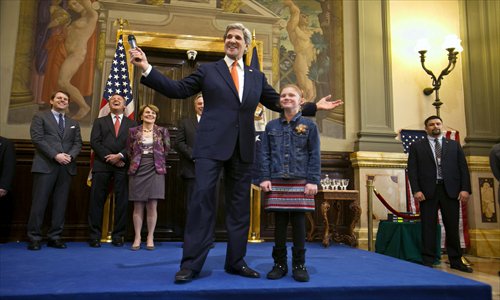Icing the ‘Asia pivot’

US Secretary of State John Kerry wrapped up his first overseas trip Wednesday as his country's top diplomat, after visiting nine European and Middle Eastern countries as part of a "listening tour." His trip aimed to reaffirm Washington's trans-Atlantic friendship and discuss tension in the Middle East, but it also reignited debate about the timing of Washington's "Asia pivot."
Differing from his predecessor Hillary Clinton, who visited Asia-Pacific nations on her maiden trip overseas in the post, Kerry's tour has been seen by some analysts as a return to business as usual in US foreign policy.
The "Asia pivot" is considered a legacy of Clinton and US President Barack Obama's first administration, but when Kerry spoke at his January confirmation hearing, he said, "I'm not convinced that increased military ramp-up in the Asia-Pacific is critical yet. That's something I'd want to look at very carefully."
Dependence on Europe
Last week in Germany, where Kerry spent some time as a child with his father, he again played down the "Asia pivot" strategy by stressing Washington's attention in the region would "not come at the expense of Europe."
After much talk about a pivot to Asia, the US appeared set to back away from its strategy and return into the arms of old allies. But analysts say the US is simply seeking a more balanced strategy by refocusing on the Middle East and Europe as a result of pressing concerns in Syria and Iran, as well as the wider impact of the EU's financial crisis.
"Secretary Kerry's trip to Europe is symbolically important. It shows that the current problems in the Middle East and trans-Atlantic relationship take precedent over the White House's preference for a strategic refocusing on the Asia-Pacific," David Mislan, an assistant professor at the School of International Service at Washington-based American University, told the Global Times.
Ni Feng, vice director of the Institute of American Studies at the Chinese Academy of Social Sciences, said during Obama's first administration, there were already different opinions in the US over whether Washington should intensify its attention on the Asia-Pacific region, adding the White House feared this could trigger a backlash from old allies in Europe and the Middle East over such a policy.
Solidarity on Syria
Continuing tension in the Middle East, particularly from Syria's civil war and Iran's nuclear ambitions, coupled with the need for closer economic cooperation has reminded Washington of its dependence on traditional allies.
In Europe, Kerry's talks with European leaders largely focused on the trans-Atlantic free trade deal and the Syria issue. He hailed the agreement between the US and EU as a "unique opportunity" for both sides.
"To ease discontent about his efforts on the economic front at home and promote the 'Asia pivot' strategy, Obama proposed in his first term the Trans-Pacific Partnership, but it did not get a positive response from countries in the region," Ni said.
"As the US refocuses on old European allies, Obama wants to use the US-EU free trade deal to build the trans-Atlantic friendship."
But a more important mission for Kerry was to elicit further support among allies on the issue of Syria.
The US has repeatedly made it clear it wants Syrian President Bashar al-Assad to step down to end his country's conflict, but Assad's resolute stance has made such an outcome unlikely.
Britain said Wednesday it would offer body armor and armored vehicles to Syrian rebels battling government troops, following an EU pledge to supply rebels with military equipment.
The statements came after Kerry announced last week at the meeting of the Friends of Syria in Rome that Washington would for the first time provide medical supplies and food directly to Syrian rebels. He also pledged $60 million more in non-lethal aid, in addition to more than $50 million already offered.
Seeking balance
Kerry has even indicated that the US could mull further action against Syria if Assad does not cede power peacefully, although Washington has so far rejected offering direct military aid to Syrian rebels.
"The Obama administration would also try its best to avoid the risk of repeating what happened in post-war Iraq and Libya. The situation in these countries must have reminded the US of the importance of its traditional allies in Europe and Middle East," Ni told the Global Times.
Robert Kennedy, a professor at the Sam Nunn School of International Affairs at the Atlanta-based Georgia Institute of Technology, said Washington is wary about bloodshed in Syria spreading regionally.
"The Syrian conflict could have a spillover effect in the region, which is all the more reason to leave much of the hard work to those in the region, who are rightly concerned," he told the Global Times.
But Kennedy said although the US has many interests at stake in the Middle East, its objectives in the region must balance with Washington's broader foreign policy, especially regarding the Asia-Pacific region.
Ni said it would be foolish to believe that the US will abandon its Asia-Pacific interests anytime soon, given the region's rapid economic growth largely driven by China. Ni pointed out that while Kerry's first tour as secretary of state took him to Europe and the Middle East, Obama chose Asia for his maiden tour in his second term in office.
"A more likely situation is that the US will seek a balanced strategy for the Asia-Pacific, Europe and the Middle East," he added.
Mislan said the US focus on Europe and the Middle East does not mean that US foreign policy goals have been re-prioritized, "but it does tell us that the 'Asia pivot' won't be as quick and as simple as some might expect."
Agencies contributed to this story